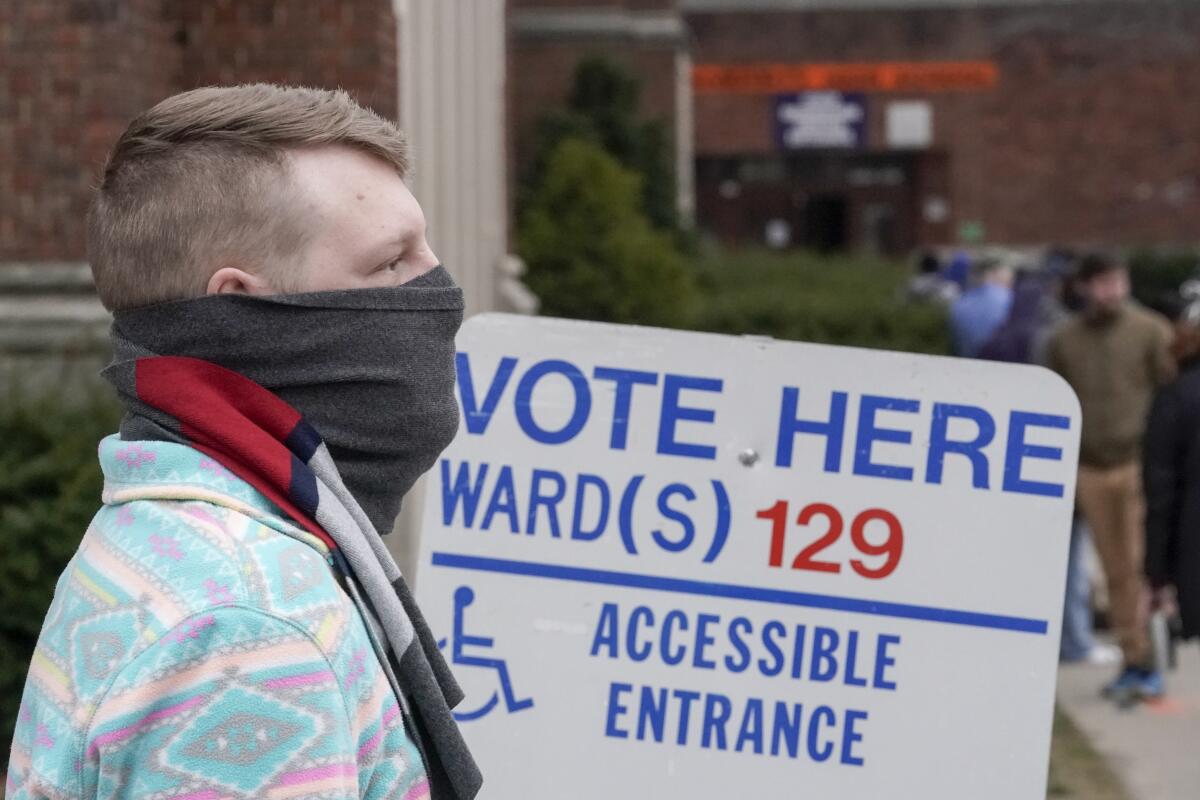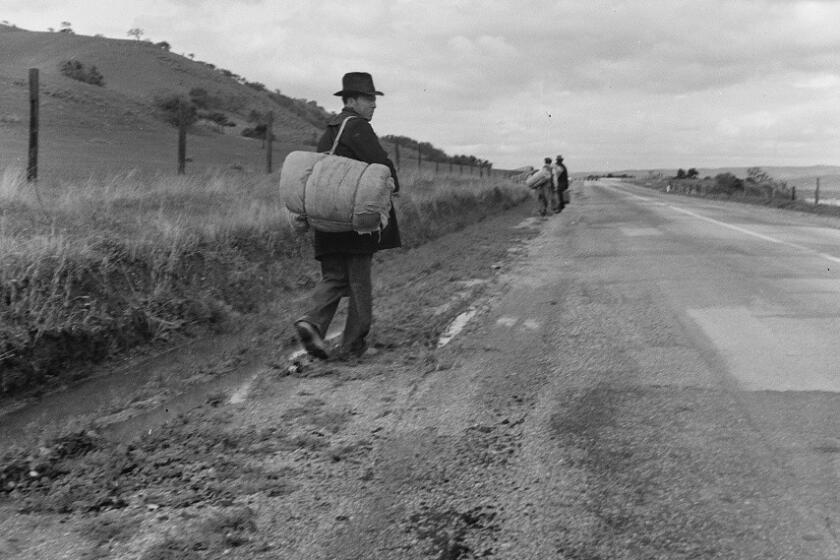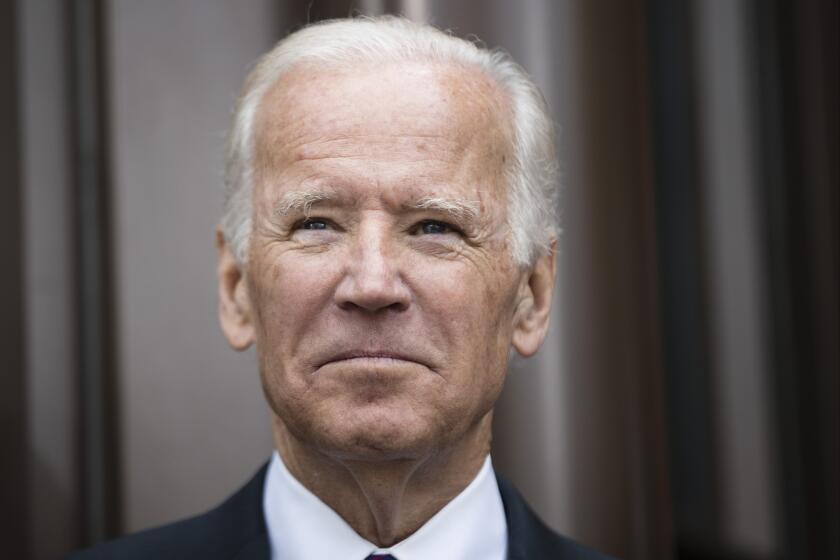Here’s how the coronavirus outbreak rewrote the presidential primary calendar

- Share via
If your Democratic primary hasn’t happened yet, you might want to double-check the date.
The coronavirus outbreak has left the presidential primary calendar in a state of flux as government officials and party leaders attempt to balance health and safety concerns with the need to continue the electoral process.
Some states have rescheduled early spring primaries for May and June or later, while working to massively expand mail balloting. In other states, such as Ohio and Wisconsin, elections turned into chaotic legal battles between those seeking to delay and those who wanted to stick to the original dates.
The latest court fight is taking place in New York. On May 5, a federal judge overturned the state Board of Elections’ decision to cancel the June 23 presidential primary.
Disruptive events like the COVID-19 outbreak can end political inertia and result in bold changes
Sixteen states have delayed their primaries, and Puerto Rico has postponed indefinitely. Two states, Montana and Kansas, have kept their primary dates but switched to vote-by-mail only. Even now, the calendar is far from settled. There are nearly two dozen presidential nominating contests between now and the Democratic convention, and what seems like a safe date today could change in a few weeks.
The Democratic presidential race has ended, with Joe Biden as the presumptive nominee after Vermont Sen. Bernie Sanders dropped out and endorsed the former vice president. But Sanders said his name would still be on the remaining ballots.
“While Vice President Biden will be the nominee, we must continue working to assemble as many delegates as possible at the Democratic convention, where we will be able to exert significant influence over the party platform,” Sanders said in his April 8 speech suspending his campaign. He endorsed Biden on April 13.
The COVID-19 pandemic also forced the Democratic National Committee to move the start of its national convention from July 13 to Aug. 17. (Republicans will hold their convention a week later in Charlotte, N.C.)
The DNC is not, however, changing the June 9 deadline for states to hold their presidential nominating contests. States that don’t make the cutoff could lose at least half their delegates; the party’s rules and bylaws committee will review requests for waivers, the DNC said. Louisiana, Kentucky, New York, New Jersey and Connecticut are holding their primaries after the deadline.
Biden has suggested Democrats may not be able to hold an in-person convention.
The COVID-19 pandemic has the country’s politics in turmoil. Answers to those questions and more.
“We may have to do a virtual convention. I think we should be thinking about that right now,” Biden said April 5 on ABC’s “This Week.”
“We may not be able to put 10-, 20-, 30,000 people in one place,” he said.
Here’s where the rest of the Democratic presidential primary calendar stands — for now.
May
May 12 — Nebraska. 29 delegates. Polls will be open, voters may request an absentee ballot.
May 19 —Oregon. 61 delegates. Vote-by-mail only. Ballots are due by 8 p.m. on election day.
May 22 — Hawaii. 24 delegates. Mail ballots only. (Rescheduled from April 4.)
June
June 2 — Delaware. 21 delegates. Polls will be open, voters may request an absentee ballot. (Rescheduled from April 28.)
June 2 — District of Columbia. 20 delegates. A reduced number of polling places will be open, voters may request an absentee ballot.
June 2 — Indiana. 82 delegates. Polls will be open, voters may request an absentee ballot. (Rescheduled from May 5.)
June 2 — Maryland. 96 delegates. Election officials have recommended limited in-person voting. (Rescheduled from April 28.)
June 2 — Montana. 19 delegates. The governor has given counties the option to move to vote-by-mail and expand early voting.
June 2 — New Mexico. 34 delegates. Polls will be open, voters may request an absentee ballot.
June 2 — Pennsylvania. 186 delegates. Polls will be open, voters may request an absentee ballot. (Rescheduled from April 28.)
June 2 — Rhode Island. 26 delegates. Polls will be open. All voters will be mailed an application to vote by mail. (Rescheduled from April 28.)
June 2 — South Dakota. 16 delegates. Polls will be open, voters may request an absentee ballot.
June 6 — Virgin Islands. Seven delegates. Caucuses.
June 9 — Georgia. 105 delegates. Polls will be open and early voting will resume on April 27; voters may request an absentee ballot. (Rescheduled from March 24.)
June 9 —West Virginia. 28 delegates. Polls will be open, voters may request an absentee ballot. (Rescheduled from May 12.)
June 23 — Kentucky. 54 delegates. Polls will be open, voters may request an absentee ballot. (Rescheduled from May 19.)
June 23 — New York. 274 delegates. Polls will be open, voters may request an absentee ballot. (Voting originally scheduled for April 28.)
July
July 7 — New Jersey. 126 delegates. Polls will be open, voters may request an absentee ballot. (Rescheduled from June 2.)
July 11 — Louisiana. 54 delegates. Polls will be open, voters may request an absentee ballot. (Rescheduled from April 4.)
August
Aug. 11 — Connecticut. 60 delegates. Polls will be open, voters may request an absentee ballot. (Rescheduled from April 28.)
Aug. 17-20 — Democratic National Convention in Milwaukee. (Rescheduled from July 13-16.)
Date TBD
Postponed indefinitely — Puerto Rico. 51 delegates. (Voting originally scheduled for March 29.)
More to Read
Get the L.A. Times Politics newsletter
Deeply reported insights into legislation, politics and policy from Sacramento, Washington and beyond. In your inbox twice per week.
You may occasionally receive promotional content from the Los Angeles Times.













